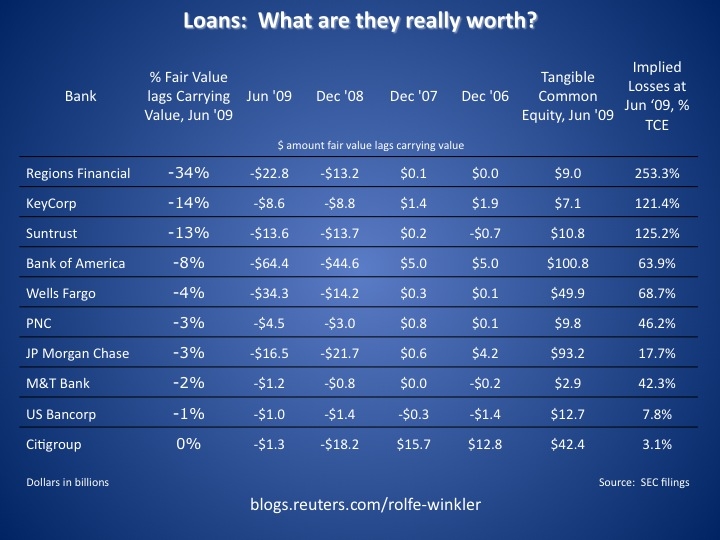Some less-than-green-shoots seem to be causing consternation today amongst the run&gun crowd. Here are 10 items worth your time:
• For FDIC, Friday Means Failures (The Deal) Each Friday night, the Federal Deposit Insurance Corp. preps its SWAT teams of regulators to fan out and secure more banks. No one other than FDIC Chairman Sheila Bair and her staff know for certain who’s next after 72 banks failed this year, almost 3 times as many as last year’s 25. see also BB&T Acquires Colonial as Regulators Close Five U.S. Lenders (Bloomberg)
• Behavioral Economist Richard Thaler on the Health Care debate (NYT)
• America’s Japanese banks (Rolfe Winkler) A banking system loaded down with hundreds of billions of dollars worth of unrecognized bad debt — Japan in the 1990s? No, it’s the United States today. And where are American banks hiding their losses? In loan portfolios.
• Poll: 57% don’t see stimulus working (USA TODAY/Gallup Poll) 57% of adults say the stimulus package is having no impact on the economy or making it worse. Even more —60% — doubt that the stimulus plan will help the economy in the years ahead, and only 18% say it has done anything to help improve their personal situation.
• Weak consumer spending will last for years (naked capitalism)
• What’s luck got to do with it? The math of gambling (New Scientist) When Thorp stood at the roulette wheel in the summer of 1961 there was no need for nerves – he was armed with the first “wearable” computer, one that could predict the outcome of the spin. Once the ball was in play, Thorp fed the computer information about the speed and position of the ball and the wheel using a microswitch inside his shoe.
• The USG doesn’t need foreigners to finance the US fiscal deficit? Who knew? (China Financial Markets)
• Pandora’s Boombox RIPPED: How the Wired Generation Revolutionized Music (NYT) “Ripped” ranges from the days when the record companies gnashed their teeth over the growth of home taping, to music publishers’ blunt attacks on sampling in hip-hop, to the life, death and canonization of Napster, to the iPod and beyond. It also examines the constant consolidation — in the music companies, in radio, in concert promotion — that helped lead to the industry’s implosion.
• How the brain hard-wires us to love Google, Twitter, and texting. And why that’s dangerous For humans, this desire to search is not just about fulfilling our physical needs. Humans can get just as excited about abstract rewards as tangible ones. He says that when we get thrilled about the world of ideas, about making intellectual connections, about divining meaning, it is the seeking circuits that are firing.
• CNBC: ‘Anyone Who Owns A Suit Can Come On Television’ (The Onion) Citing a need to provide quality programming 24 hours a day, CNBC has extended an invitation to anyone who owns a suit to drop by the financial news network and be a guest expert, cohost a show with Larry Kudlow, or do whatever.
Anything worthwhile I am missing?



What's been said:
Discussions found on the web: